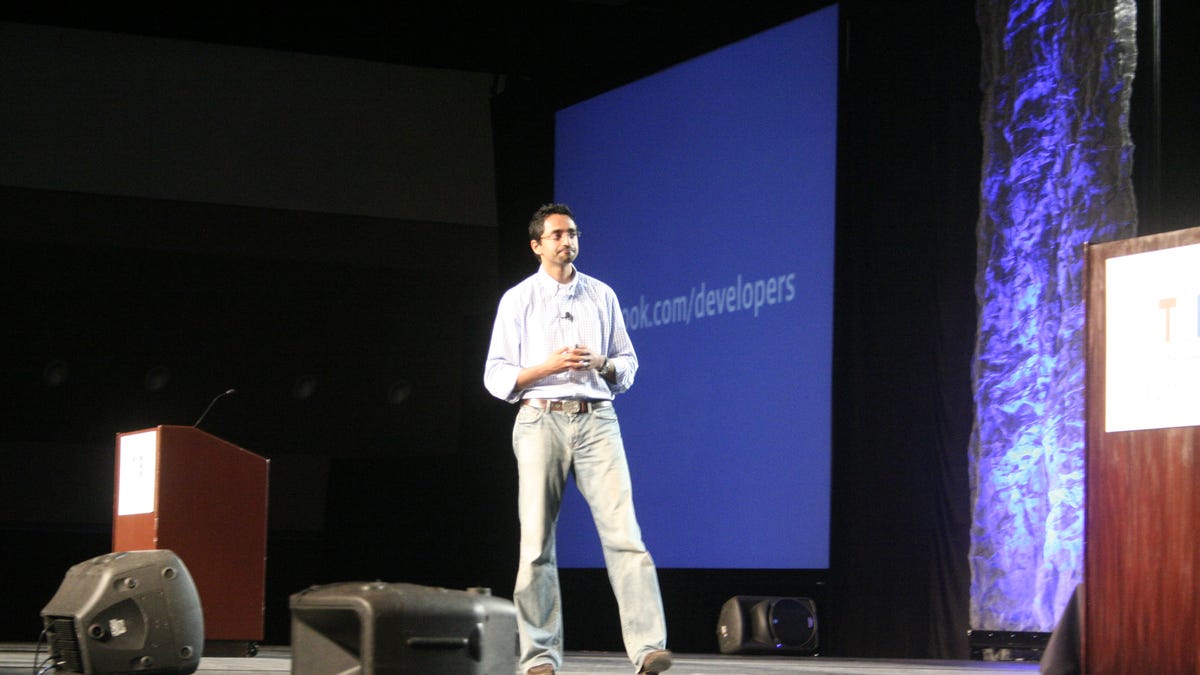Facebook exec: We're the Net's cable company
Chamath Palihapitiya tells conference-goers that Facebook is the next-generation platform that can turn any ambitious entrepreneur (with the right application) into an overnight success.

SANTA CLARA, Calif.--As you might expect from a vice president of product marketing, Facebook's Chamath Palihapitiya can deliver a convincing sales pitch.
His sell: Facebook is the next-generation platform of the Internet that can turn any ambitious entrepreneur (with the right application) into an overnight success. He rattled off the stats to back up the argument.
The average development time, he said, for an entrepreneur to build a Facebook application is between two and 15 weeks, according to a self-reported survey of its developer community. The average number of employees to make those applications: between one and five people. And about 33 percent of Facebook application makers reported profits of up to $500,000 a month. Finally, at least one-quarter of the applications running on Facebook have 100,000 active daily users.
"The barrier to entry is lower than it's ever been," Palihapitiya said to an audience here Saturday at the TieCon conference. "When you build something social, you get immediately rewarded with distribution. You will allow your user base to be your marketers."
Palihapitiya, a former venture capitalist at the Mayfield Fund and one-time head of AOL's instant messaging application, knew his audience. TieCon is a two-day conference cut out for technology entrepreneurs; and it attracted as many as 4,000 attendees. But some attendees said that at times, the talk was too wonky (with terms like "social stack") and heavy on PowerPoint. At least one attendee said that the speech was a "good sell."
Luring more developers to Facebook is essential for the company's plans to become, as Palihapitiya said, the network operator of the Internet.
"We view ourselves as a technology company at our core. We're the cable company creating the pipes, and what they carry is social information and engagement information about people," he said.
"That plumbing should exist around the Internet, and then what happens is that people can create truly social experiences on the Web. As long as we can build the plumbing for this, we view that as a success."
For example, he talked about and illustrated (via PowerPoint) the so-called social stack, or the elements to create social experiences on the Web. Those include wide distribution on the Internet and being able to securely port your personal identity anywhere online. He said that Facebook is helping people manage their identity with privacy settings. And the company is opening distribution for developers so that their applications will be judged by merit.
"The rules of distribution are changing fundamentally. When you're an entrepreneur all you need is one person to like it, one person to be an advocate of it, and then their friends find out and engage in that."
What does Facebook gain from becoming the Internet's cable company? Palihapitiya didn't exactly say, but it hinges on all that social data captured about individuals and their friends. He said that developers make money, largely through advertising, without tax from Facebook. And he said Facebook will probably come up with its own products that developers can use to make money, presumably referring to an advertising platform.
Last year, the company backed up its commitment to developers when it introduced the Facebook Fund (or fbFund), which grants up to $250,000 to promising entrepreneurs without asking for equity. (Facebook worked in partnership with Accel and the Founders Fund to launch this initiative.) He said that Facebook has already funded a New York-based Indian couple that is working on a social application for people who are planning to get married and want the help of friends.
In a Nike-esque call to entrepreneurs, he added: "We want you to be empowered to do it."